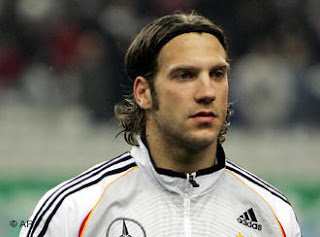
His first match for Werder Bremen came in the DFB-Ligapokal (League Cup). Werder Bremen won the cup beating Bayern Munich in the final on 5 August.
The 2006–07 Bundesliga season began well for Diego. He scored the first goal and set up two more for Bremen in their 4-2 win over Hannover 96, on 13 August. In his second match in the Bundesliga he set up both goals in the 2-1 win over Bayer Leverkusen.
Thanks to his good performances in August, both in the Bundesliga and in the Premiere Ligapokal, Diego won the August Player of the Month award. As the Bundesliga season went on, Diego made several amazing performances and became one of the most valuable players for Werder Bremen, along with his team-mate Torsten Frings. They are called the "two motors of Bremen's midfield." In October 2006, he won a second Player of the Month award and again in December 2006. He was then named as the Best Player of the first half of the Bundesliga.
Werder Bremen finished in third place in Group A in the Champions League group stages, and they moved to the UEFA Cup, where they reached the semi-finals, beating AZ from the Netherlands in the quarter-finals, due in part to Diego's creative play.
On 15 April, Diego again played well, scoring in the 2-0 win over Borussia Dortmund. Five days later, on 20 April, Bremen played against Alemannia Aachen. Although Diego's performance was good, he did not score until stoppage time when he scored from 62.5 metres, which later was elected as goal of the year. Bremen won the game 3-1 and topped the table with 60 points.
Following his good performances in the first half of the Bundesliga, Diego got called up to the Brazilian national football team in November.
After the 2006–07 season ended, Diego won the Bundesliga Player of the Season award organised by popular magazine Kicker. He got just over 50 percent of the votes. Unfortunately, his team did not win the Bundesliga after finishing 3rd in the table, behind champions VfB Stuttgart and Schalke 04.
On the first Champions League Group Stage matchday, Bremen lost 2-1 to Real Madrid, but Diego's performance aroused interest in Real Madrid's coach Bernd Schuster. But the stories were put to an end when Diego signed a new contract which would last until 2011.
After the loss to Real Madrid, Bremen faced VfB Stuttgart, the defending German champions, at home. Werder won 4-1, with Diego leading the midfield. Later on in the season, Bremen achieved a historical 8-1 win over Arminia Bielefeld, with Diego assisting three goals and scoring one himself.
Diego was voted Player of the Month in September.
He then scored two goals on the way to the UEFA Cup quarter final with Bremen.
In Uefa Cup competition that season, Diego scored 6 goals, all in knockout stages (since Bremen dropped out from the Uefa Champions League into Uefa Cup's round of 32).
He scored against AC Milan the in round of 32, equalizing after 84' minutes, and assisting Claudio Pizarro in the second leg to one goal. He helped his team through the round of 16, And in the quarter final against Udinese, he brilliantly scored four goals out of six in the two meetings, and assisting one.
In the semi finals, after losing 1-0 in their hometown to Hamburg, Diego helped his team back in the second leg with an early equalizer to Ivica Olic's early critical goal. Later on that game, he Assisted a corner to Frank Baumann's 3rd Bremen goal. In that game, Diego received an unfortunate yellow card, preventing him from playing in the final, but still with a 3-2 heroic away win, he ended his Uefa Cup participation, leading Bremen to their first Uefa Cup final ever.
Without Diego in the 2009 Uefa Cup final, Bremen lost the game 2-1 in extra time to Ukranian team Shakhtar Donetsk.
In his last match with Bremen, Diego gave the assist to Mesut Özil's victory goal against Bayer Leverkusen in the German Cup final, to win the German Cup for the sixth time.
Diego made his Juventus debut against the Korean side Seongnam where they won 3-0. In the first half Diego made the pass to Camoranesi whose pass followed up to a goal. Diego then scored in the second half and then subbed out at the 60th minute. On his Serie A debut he assisted Iaquinta's goal from a set-piece. In the second fixture of the campaign, Diego recorded his first Serie A goal, scoring twice in Juventus' 3-1 victory against Roma on August 30, 2009.








 CAREER
CAREER